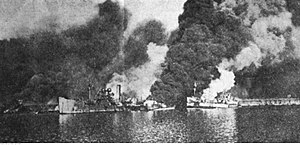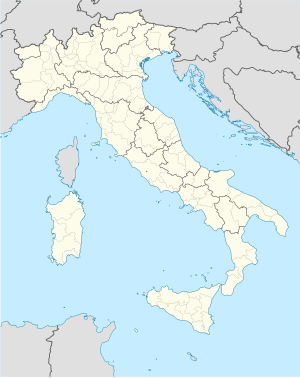| Air raid on Bari, Italy | |||||||
|---|---|---|---|---|---|---|---|
| Part of the Italian Campaign of World War II | |||||||
 Allied ships burn during the German attack on Bari | |||||||
| |||||||
| Belligerents | |||||||
|
|
| ||||||
| Commanders and leaders | |||||||
|
|
| ||||||
| Strength | |||||||
| 105 Junkers Ju 88 A-4 bombers | |||||||
| Casualties and losses | |||||||
| One aircraft destroyed |
29 ships sunk harbor extensively damaged 1,000 military and merchant marine personnel killed 1,000 civilians killed[1] | ||||||
The air raid on Bari (German: Luftangriff auf den Hafen von Bari, Italian: Bombardamento di Bari) was an air attack by German bombers on Allied forces and shipping in Bari, Italy, on 2 December 1943, during World War II. 105 German Junkers Ju 88 bombers of Luftflotte 2 surprised the port's defenders and bombed shipping and personnel operating in support of the Allied Italian Campaign, sinking 27 cargo and transport ships, as well as a schooner, in Bari harbour.
The attack lasted a little more than an hour and put the port out of action until February 1944. The release of mustard gas from one of the wrecked cargo ships added to the loss of life. The British and US governments covered up the presence of mustard gas and its effects on victims of the raid.
- ^ Atkinson (2007), pp. 275–276.
